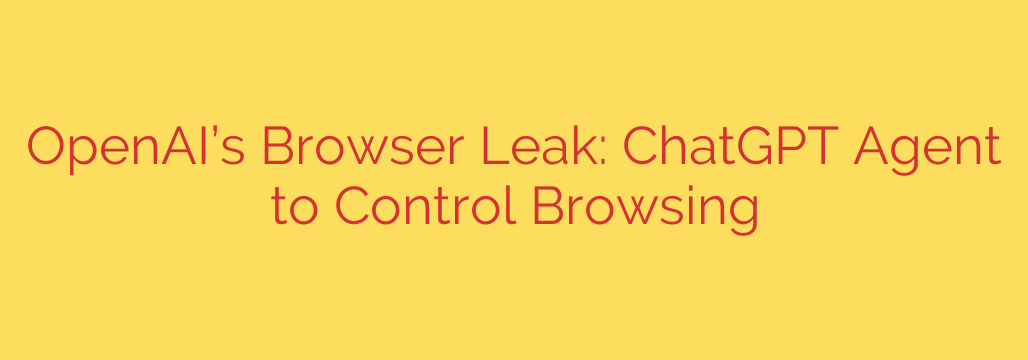
ChatGPT’s Next Big Leap: An AI Agent That Browses the Web For You
The way we interact with the internet is on the cusp of a monumental shift. For years, we’ve been the ones clicking, typing, and navigating the complexities of the web. But what if an AI could do it all for you? Recent developments suggest that OpenAI is on the verge of launching a new “AI agent” for ChatGPT, a tool designed to autonomously control a web browser to complete tasks on your behalf.
This isn’t just another browser extension or a simple plugin. This is a powerful leap forward in AI automation—a digital assistant capable of taking a high-level command and executing the multiple steps required to finish it. Imagine asking an AI to “find the best flight deals to Tokyo for the first week of June and compile the options in a spreadsheet.” Instead of just providing links, this agent could autonomously navigate airline websites, input your criteria, analyze the results, and populate a document with the data.
What is an AI Web Agent and How Does It Work?
At its core, an AI web agent acts as a sophisticated operator for your web browser. Unlike a chatbot that simply provides information, this agent can perform actions. Based on information that has come to light, this technology will likely operate within a dedicated, secure browser environment.
This agent would be able to:
- Navigate Websites: Move from page to page, following links and logic.
- Fill Out Forms: Enter information into fields for bookings, sign-ups, or searches.
- Click Buttons and Menus: Interact with user interfaces just like a human would.
- Extract and Process Information: Scrape data from a page, understand its context, and use it to complete the next step of a task.
The potential here is immense. This tool could transform productivity by automating the tedious, repetitive tasks that consume a significant portion of our digital lives.
The Game-Changing Potential for Productivity
The introduction of a capable AI browsing agent could revolutionize workflows across countless industries and personal tasks. Instead of manually performing multi-step processes, you could delegate them entirely.
Consider these potential use cases:
- Automated Market Research: A business could task the agent with gathering competitor pricing, customer reviews, and news mentions, compiling everything into a single, comprehensive report.
- Effortless Travel Planning: The agent could handle everything from finding flights and hotels that match complex criteria (e.g., “layovers under 2 hours, hotel with a gym”) to booking rental cars.
- Streamlined Online Shopping: Ask the agent to find a specific product from three different retailers, compare their prices and shipping times, and even add the best option to your cart.
- Complex Data Entry: An agent could be instructed to take data from a PDF file and manually enter it into a web-based CRM or project management tool, saving hours of manual labor.
Essentially, any task that follows a repeatable set of actions on the web becomes a candidate for full automation. This frees up human intellect for more strategic, creative, and high-level thinking.
Navigating the Critical Security and Privacy Questions
With great power comes great responsibility, and the concept of an AI autonomously browsing the web raises immediate and important security concerns. Handing over control of your browser, which is a gateway to your personal and financial information, is a significant step.
The primary risk is the potential for unauthorized or erroneous actions. What if the agent misunderstands a command and makes an unintended purchase? What if it navigates to a phishing website and enters sensitive credentials?
To mitigate these risks, the system is expected to run in a secure, sandboxed browser environment. This means the AI’s browsing session would be isolated from your main browser, preventing it from accessing your personal cookies, saved passwords, or browsing history. Every action would occur within a controlled space, giving users a layer of protection.
Furthermore, data privacy remains a key question. Users will need clear information on how their commands and the data processed by the agent are stored and used by OpenAI. Building user trust will be paramount to the successful adoption of such a powerful tool.
How to Prepare for the AI Agent Era
While this technology is not yet publicly available, its eventual arrival seems inevitable. Here are a few steps you can take to ensure you are ready to leverage its benefits safely:
- Strengthen Your Digital Security: The foundation of safe AI use is strong personal security. Ensure you are using unique, complex passwords for every account and have two-factor authentication (2FA) enabled wherever possible. An AI agent can only access what your credentials permit.
- Understand the Principle of Least Privilege: When the tool becomes available, don’t grant it broad, sweeping permissions on day one. Start by using it for low-stakes, non-sensitive tasks to understand its capabilities and limitations.
- Stay Informed: Keep up with developments in AI safety and best practices. As these tools evolve, so will the methods for using them securely and effectively.
The emergence of an AI web agent represents more than just a new feature; it signals a fundamental change in our relationship with technology. We are moving from a world where we command computers to one where we collaborate with intelligent agents, delegating entire workflows to our digital counterparts. The journey will undoubtedly have its challenges, but the potential to unlock unprecedented levels of productivity and efficiency is truly exciting.
Source: https://www.bleepingcomputer.com/news/artificial-intelligence/leak-openais-browser-will-use-chatgpt-agent-to-control-the-browser/








